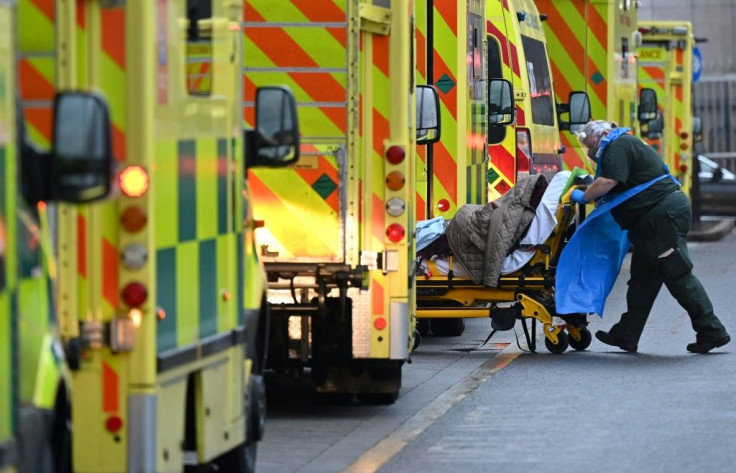UK Scrambles For Hospital Beds As Virus Surges
Medical chiefs in England raced to boost treatment capacity on Thursday as a surge in coronavirus cases risked overwhelming hospitals, even as the government stepped up its mass inoculation campaign.
A leaked briefing suggested that London's hospitals were on the brink of running out of beds, endangering the lives of patients needing critical care.
The UK on Thursday recorded another 1,162 deaths within 28 days of a positive test for Covid-19 -- the second highest toll since the peak of the first wave in April last year.
There were more than 52,000 new cases in 24 hours, taking the overall number of infections to nearly 2.9 million, following the emergence of a new coronavirus strain in southeast England last month which has seen other countries ban travel from Britain.
Prime Minister Boris Johnson imposed a third stay-at-home order this week and said in the face of the "tragic number of deaths", the government was "really throwing everything" at its world-first vaccine rollout programme, with military backing.
The chief executive of England's National Health Service (NHS), Simon Stevens, gave stark warnings of the mounting stress on hospitals.
"The pressures are real and they are growing," he said, adding that public compliance with the lockdown and medical advice was vital "to kill the growth of infection".
The NHS head said there were 50 percent more Covid patients in hospitals now than during the April peak.
Some 10,000 more coronavirus patients have been hospitalised since December 25 alone, the equivalent of 20 acute-care hospitals.
"Staff are exhausted," said Lindsey Izard, matron of the general intensive care unit at St George's Hospital in London. "The worry is that we haven't probably reached the peak yet."

The sharp rise has forced hospital bosses to consider shifting some in-patients to beds in nursing homes or care homes, said Chris Hopson, the head of NHS Providers, which represents hospitals in England.
But the health ministry signalled possible relief by announcing that two "live-saving" Covid treatments would be made available for patients in intensive care.
The drugs -- tocilizumab and sarilumab -- have been shown to reduce risk of death by 24 percent for critically ill patients, and cut the time spent in intensive care by up to 10 days, it said.
Health Secretary Matt Hancock called the deployment of the drugs, normally used for rheumatoid arthritis, a "landmark development". Johnson said they could save thousands of lives.
Britain has seen more than 78,500 deaths in the outbreak and is banking on the rollout of the Pfizer/BioNTech and Oxford/AstraZeneca vaccines to halt the spread of the virus.
Almost 1.5 million people across the UK have now received jabs, Johnson said.
He added the government aims to have inoculated 15 million of the most vulnerable groups, including frontline NHS staff, by mid-February, with all involved including the armed forces working "round the clock if necessary".
Hancock vowed to a parliamentary committee: "The number of deaths in this country will fall for any given number of cases once the vaccine is rolled out to the vulnerable groups."
HSJ, a website for healthcare professionals, on Wednesday leaked a briefing by the head of NHS London, Vin Diwakar, saying the capital could be short of nearly 1,500 beds for general and acute patients by January 19.
In the worst-case scenario, the shortfall could be 4,400 beds, it said.
"Unless we take the lockdown seriously, the impact on healthcare for the whole country could be catastrophic, and I don't say those words lightly," Rupert Pearse, a professor of intensive care medicine at Queen Mary, University of London, told the BBC.
© Copyright AFP 2024. All rights reserved.




















